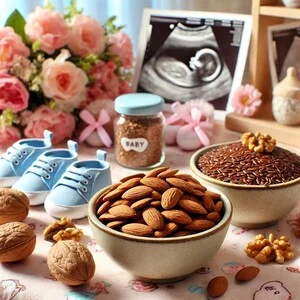Discover the best foods and trimester-specific meal plans to create a balanced pregnancy diet. Includes Indian diet tips and expert guidance.
Pregnancy is a beautiful journey that comes with its own unique nutritional needs. What a mother eats impacts her health and directly influences her baby’s growth and development.
For best results, personalize your diet to match your unique health needs and preferences, ensuring optimal nutrition at every stage of pregnancy.
Best Nutritionist in Bangalore
Consult 19-year-experienced Chief Nutritionist Vasanthi, in person at HSR, Koramangala, Bellandur, Haralur, Electronic city, or online across India.

Table of Content
Top 10 Foods for a Healthy Pregnancy Diet
This guide highlights the top 10 essential foods for a healthy pregnancy diet, packed with vital vitamins and minerals for both mom and baby.

1. Leafy Greens: Spinach, Methi, and More for Iron and Folic Acid
Iron and folic acid are two of the most important nutrients during pregnancy, and leafy greens are a powerful source of both. Iron prevents anemia, a common issue among Indian women, while folic acid supports neural development in the baby. Spinach (palak) and fenugreek (methi) are excellent options.
How to Include in Your Diet:
Prepare a simple palak dal, add methi to your rotis, or make a mixed green salad with lemon for better iron absorption.
2. Dairy Products: Milk, Curd, and Paneer for Calcium and Protein
Calcium is critical for developing the baby’s bones and teeth, and protein aids in tissue formation. Dairy products like milk, curd, and paneer are excellent sources of nutrients and are a staple in many Indian households.
How to Include in Your Diet:
Enjoy a glass of milk with a pinch of turmeric at night for restful sleep, add curd to your meals for digestion, or snack on grilled paneer for extra protein.
3. Lentils and Pulses: Chana, Moong Dal, and Rajma for Protein and Fiber
Lentils and pulses provide high-quality, plant-based protein, fiber, and essential minerals such as magnesium and potassium. Lentils like moong dal, chickpeas (chana), and kidney beans (rajma) are not only filling but also supporting digestive health by preventing constipation, a common pregnancy concern.
How to Include in Your Diet:
Make dal soups, chana salads, or rajma curry. Pair with rice or roti for a complete meal.
4. Eggs: Complete Protein and Choline for Brain Health
Eggs are a nearly perfect food for pregnancy, packed with protein, healthy fats, and choline, an essential nutrient for the baby’s brain development. If you’re concerned about cholesterol, focus on eating egg whites but don’t skip yolks entirely unless advised by your doctor.
How to Include in Your Diet:
Have a boiled egg with breakfast, make an omelet with vegetables for extra fiber, or add scrambled eggs to a multigrain wrap.
5. Whole Grains: Brown Rice, Bajra, and Quinoa for Energy and Digestion
Pregnancy demands more energy, and whole grains provide complex carbohydrates that sustain energy levels without spiking blood sugar. Brown rice, bajra, and quinoa are great sources of fiber, B vitamins, and essential minerals.
How to Include in Your Diet:
Cook brown rice pulao with vegetables, make bajra roti with ghee, or try a quinoa salad for a healthy lunch option.
6. Nuts and Seeds: Almonds, Walnuts, and Flaxseeds for Omega-3 Fatty Acids and Healthy Fats
Healthy fats are crucial for both maternal health and the baby’s brain and eye development. Nuts like almonds and walnuts are rich in omega-3 fatty acids and healthy fats, while flaxseeds provide a plant-based source of omega-3s.
How to Include in Your Diet:
Snack on a handful of mixed nuts daily, add flaxseed powder to your smoothies, or top your salads with chopped walnuts for a crunchy boost.

7. Citrus Fruits: Oranges and More for Vitamin C and Hydration
Oranges and other citrus fruits are packed with vitamin C, which enhances iron absorption and boosts immunity. They are also high in water content, helping keep you hydrated and preventing common pregnancy ailments like dry skin.
How to Include in Your Diet:
Drink a glass of fresh orange juice in the morning, snack on tangerines, or make a fruit salad with kiwi, oranges, and strawberries for a vitamin C boost.
8. Sweet Potatoes: Vitamin A-Rich Foods for Immune and Eye Health
Vitamin A is essential for the development of the baby’s heart, lungs, and eyes. Sweet potatoes are an ideal source of beta-carotene, a precursor to vitamin A, and they also provide fiber, which helps prevent constipation.
How to Include in Your Diet:
Roast sweet potato slices with spices, add them to stews, or make a sweet potato chaat with lemon and spices for a tangy snack.
9. Bananas: Quick Energy Boost and Prevention of Nausea
Rich in potassium and vitamin B6, bananas help maintain fluid balance, prevent cramps, and can even reduce morning sickness. They also make an easy, quick snack when you’re in need of an energy boost.
How to Include in Your Diet:
Have a banana smoothie with milk, slice them over porridge, or carry one in your bag for a quick snack on busy days.

10. Lean Meats: Chicken and Fish for Iron and Omega-3 Fatty Acids
Lean meats like chicken and fish provide high-quality protein and iron. Iron from animal sources (heme iron) is more easily absorbed by the body, making it beneficial during pregnancy. Additionally, fatty fish like salmon are rich in omega-3 fatty acids, which promote brain and eye development.
How to Include in Your Diet:
Enjoy grilled chicken with salad, make a simple chicken curry with minimal spices, or grill fish like salmon. Avoid fish high in mercury, such as swordfish or mackerel.
Expert Tips for a Healthy Pregnancy
- Consult a Nutritionist: Before making major changes, consult our Chief Nutritionist Vasanthi to tailor your diet to your needs and preferences.
- Stay Hydrated: Drink plenty of water, coconut water, or buttermilk to stay hydrated.
- Avoid Certain Foods: Skip raw or undercooked meat, unpasteurized dairy, and high-mercury fish to minimize health risks.
- Include Small, Frequent Meals: Instead of three large meals, aim for five to six smaller ones to stabilize blood sugar and avoid nausea.
- Prioritize Fresh, Homemade Food: Freshly prepared meals lower the risk of foodborne illness and ensure a healthy diet throughout pregnancy.
Pregnancy Diet Plans for Every Trimester
Pregnancy is a transformative journey, and your nutritional needs evolve with each trimester. This guide breaks down trimester-specific meal plans, each curated to meet the changing requirements of the mother and baby. With a focus on Indian foods, these meal plans offer a balanced blend of traditional and modern nutritional advice, ensuring both health and satisfaction.

First Trimester Pregnancy Diet Plan: Ease Nausea and Boost Nutrients
In the first trimester, it’s common to experience nausea and food aversions, so a balanced and gentle diet is key. Foods rich in folic acid, vitamin B6, and iron can help combat morning sickness and provide foundational nutrients for the baby’s development.
Breakfast Ideas
- Moong Dal Cheela with Curd: High in protein and easy on the stomach.
- Oats with Nuts: Rich in fiber, which aids digestion and helps with morning sickness.
- Sprout Salad with Lime Juice: Light and packed with folate and iron.
Mid-Morning Snack
- A Banana or Apple with Almonds: Provides potassium and healthy fats, which can ease nausea.
- Coconut Water: Helps with hydration, crucial in the first trimester.
Lunch
- Khichdi with Vegetables: A gentle, nutrient-dense dish with rice, dal, and seasonal vegetables.
- Chapati with Spinach Dal: Spinach is high in iron and folic acid, essential for fetal development.
- Curd Rice: Soothing and beneficial for digestion.
Evening Snack
- Smoothie with Curd: Rich in calcium and probiotics, great for gut health.
- Roasted Makhana: A light and healthy snack that curbs cravings.
Dinner
- Vegetable Soup with Chapati: Light, hydrating, and easy to digest.
- Mixed Vegetable Paratha with Curd: Provides fiber and protein without overwhelming the stomach.
- Tomato Dal with Brown Rice: Offers iron and vitamin C, which enhances iron absorption.
Second Trimester Pregnancy Diet Plan: Support Growth and Development
The second trimester is often called the “honeymoon phase” of pregnancy. As morning sickness subsides, appetite usually improves, and energy needs increase to support the baby’s growth. Focus on iron, calcium, and protein-rich foods to keep up with these changes.
Breakfast Ideas
- Rava Upma with Vegetables: A quick, energy-boosting meal with essential carbs and vitamins.
- Multi-Grain Dosa with Coconut Chutney: Provides complex carbs and healthy fats.
- Poha with Sprouts and Peanuts: An iron-rich option that’s light and filling.
Mid-Morning Snack
- Fruit Smoothie with Flaxseeds: Omega-3 fatty acids from flaxseeds support the baby’s brain development.
- Handful of Walnuts and Dates: A natural source of iron, fiber, and healthy fats.
Lunch
- Rajma with Brown Rice: Rajma is packed with protein and fiber, perfect for sustained energy.
- Stuffed Baingan with Chapati: Rich in folate and fiber, aiding in digestion.
- Paneer Tikka with Roti and Salad: Adds protein, essential for muscle development.
Evening Snack
- Hummus with Veggie Sticks: A satisfying snack rich in protein and fiber.
- Idli with Coconut Chutney: Gentle on the stomach and full of energy.
Dinner
- Palak Paneer with Jowar Roti: High in calcium and iron, supporting bone health.
- Dal Makhani with Rice: Provides protein and iron, needed for red blood cell production.
- Vegetable Pulao with Raita: A balanced option that is easy to digest and hydrating.
Third Trimester Pregnancy Diet Plan: Prepare for Labor and Maintain Energy
As you enter the third trimester, nutrient-dense foods become more important to prepare your body for labor and ensure optimal energy levels. Foods high in protein, fiber, healthy fats, and complex carbs are crucial to sustain both mother and baby.
Breakfast Ideas
- Multigrain Paratha with a Glass of Milk: Provides a slow release of energy and is high in calcium.
- Vegetable Oats Porridge: Fiber-packed, keeping you full and preventing constipation.
- Besan Cheela with Mint Chutney: High in protein and gentle on the stomach.
Mid-Morning Snack
- Dates and Almonds Smoothie: High in iron and healthy fats, a quick energy boost.
- Boiled Eggs with a Dash of Black Pepper: Rich in protein and essential for muscle development.
Lunch
- Chole with Rice or Roti: Provides iron and protein, ideal for sustained energy.
- Vegetable Kurma with Brown Rice: High in fiber and vitamins, perfect for digestive health.
- Dal and Jeera Rice: A simple yet effective combo for protein and easy digestion.
Evening Snack
- Sweet Potato Chaat: Rich in fiber, vitamin A, and offers a natural sweetness.
- Roasted Chana or Bhel with Sprouts: A crunchy, high-protein snack that’s light yet filling.
Dinner
- Lauki (Bottle Gourd) Sabzi with Bajra Roti: Light, hydrating, and nutrient-rich.
- Mixed Vegetable Stew with Chapati: Packed with a variety of vitamins and minerals, easy to digest.
- Moong Dal Khichdi with a Side of Curd: Soothing and nutritious, ideal for a restful sleep.
How to Customize Your Pregnancy Diet Plan
Creating a healthy pregnancy diet is important. By choosing nutrient-dense, balanced meals rich in protein, vitamins, and minerals, you support both your well-being and your baby’s growth. The foods listed above, combined with proper hydration and gentle exercise, will help you stay energized and healthy throughout your pregnancy.
For a personalized Pregnancy Diet Plan Consultation tailored to your unique needs and to discuss specific dietary requirements, book your appointment with our Chief Nutritionist Vasanthi. We’re here to help you customize your diet plan for every trimester to ensure you and your baby receive the best nutrition.
Book your Pregnancy Diet Consultation today to start a healthy and nourishing pregnancy journey.
FAQ
What foods to avoid during pregnancy?
To protect your baby, avoid raw fish, high-mercury seafood (like swordfish), unpasteurized dairy, and too much caffeine. Skip raw papaya and spicy, processed snacks to reduce stomach upset. For a full list, consult our Chief Nutritionist Vasanthi.
What can I eat during pregnancy?
Load up on nourishing foods: leafy greens, whole grains, protein from lentils and dairy (if tolerated), and seasonal fruits. Traditional staples like dal, roti, and veggie-packed meals offer balanced nutrients. Unsure if you’re getting it all? A tailored plan from a nutritionist can ensure you’re on the right track.
What to eat and what not to eat during pregnancy?
Eat iron-rich greens, protein-packed lentils, calcium from dairy, and fiber-rich bananas. Avoid oily, overly spicy, or caffeine-heavy foods. Not sure if your diet covers it all? Consulting a nutritionist can help fine-tune your intake.
What to eat at first trimester of pregnancy?
The first trimester calls for gentle, nourishing meals to ease nausea. Choose protein- and folate-rich options like moong dal, spinach, and citrus. Curious about a complete first-trimester diet? Personalized guidance can optimize your meal choices.
What to eat in first month of pregnancy?
Focus on folate-rich foods like greens and beans, iron-packed beets, and light meals like curd rice to combat early nausea. Wondering how to adjust your diet as the months go on? Talk with a nutritionist.
What to eat after giving birth?
After delivery, go for protein-packed dals, ghee-enriched chapatis, leafy greens, and fiber-rich oats. Balancing traditional recovery foods with modern nutrition? A dietitian can guide your postpartum diet for optimal recovery and breastfeeding support.
Are dairy products necessary in a pregnancy diet?
Dairy gives calcium needed for baby’s bone health, but you can substitute with calcium-rich nuts and fortified alternatives if dairy isn’t an option. Need help balancing calcium intake without dairy? A nutritionist can help personalize a plan.
What is the ideal pregnancy diet?
The ideal diet mixes leafy greens, protein-rich dals, whole grains, and essential fats from nuts and seeds. Want trimester-specific advice? An evolving meal plan ensures you’re meeting your needs as they change.
How often should I eat during pregnancy?
Frequent small meals every 2-3 hours help stabilize energy, prevent nausea, and keep you satisfied. Not sure what snacks are best? Choose balanced snacks with protein and carbs for stable energy.
Can I customize a pregnancy diet based on my health needs?
Absolutely! Tailoring your diet based on health conditions or dietary preferences helps both you and your baby. Curious about what your unique plan should look like? Consult our Chief Nutritionist Vasanthi to create a diet specific to your health and lifestyle needs.